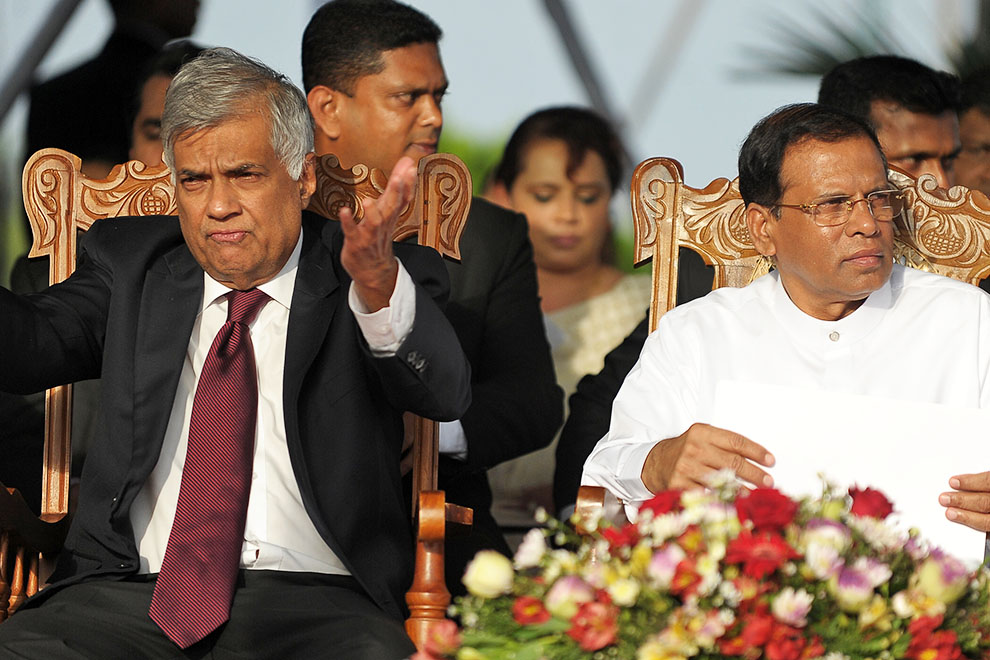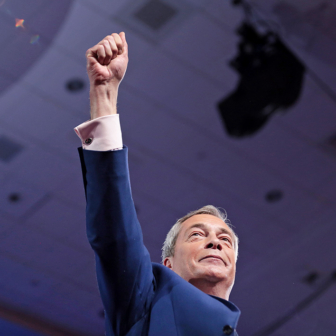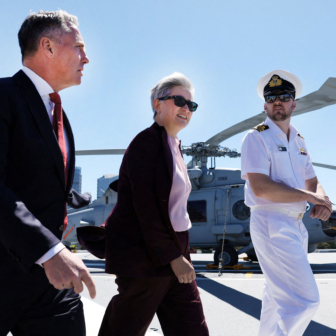The bloody end of Sri Lanka’s long civil war with the Liberation Tigers of Tamil Eelam has been marked across the country this month in very different ways, highlighting both the tentative progress made over the past year and the profound divisions still to be overcome seven years into peacetime.
Across the north and east, Tamils held public events to remember the victims killed during the final weeks of the government offensive in May 2009. While officially sanctioned on a much wider scale than last year, these commemorations often took place under the watchful, often intimidating eyes of the military or police.
In Colombo, meanwhile, president Maithripala Sirisena and prime minister Ranil Wickremesinghe sponsored a War Hero commemoration alongside the armed forces, police and civil security. But the commemoration’s cultural program, the Reminiscence of Reconciliation, represented a notable shift from the triumphalist, military-led Victory Day celebrations presided over by former president Mahinda Rajapaksa, whose administration criminalised all Tamil remembrance activities.
Despite the welcome change in tone and moves to improve relations between the majority Sinhalese community and Tamils, who represent 15 per cent of the country’s population, the “national unity” government needs to redouble its efforts to promote reconciliation. In fact, much more work remains to reverse the damage done to all communities in Sri Lanka by the decade of Rajapaksa’s authoritarian rule.
Addressing the painful legacy of the war is just one aspect of an extremely ambitious agenda that includes drafting a new constitution, strengthening the rule of law and rebuilding democratic institutions. But it remains unclear how far the government is willing and able to go to tackle the hardest reforms, particularly justice for wartime abuses and greater devolution of political power to deal with the ethnic conflict.
Worryingly, the government appears to be backtracking on vital plans for transitional justice. The enormity of the crimes committed makes them impossible to ignore, yet difficult for the military, and most Sinhalese, to accept responsibility for.
Both sides committed atrocities throughout the many years of war, which lasted from 1983 to 2009. In September 2015, the UN Office of the High Commissioner for Human Rights presented a detailed report to the UN Human Rights Council in Geneva, documenting a “horrific level of violations and abuses” by government forces, pro-government paramilitaries and the separatist Tamil Tigers. The long list of crimes included indiscriminate shelling, extrajudicial killings, enforced disappearances, torture and sexual violence, recruitment of children, and denial of humanitarian assistance. The report confirmed victim and survivor accounts of systematic war crimes committed during the final months and immediate aftermath of the civil war.
The new government – brought to power by elections in January and August 2015 – was prepared for these explosive findings, and announced its ambitious reform agenda at the start of the Human Rights Council session. It agreed to the Council’s groundbreaking resolution on promoting reconciliation and accountability, which was adopted by consensus. Key commitments included the creation of a truth commission, reparations and missing persons offices and, most controversially, an independent special court for war crimes with “participation of Commonwealth and other foreign judges, defence lawyers and authorised prosecutors and investigators.”
The resolution was potentially transformative, yet the government has missed a series of deadlines for its implementation and is sending mixed messages about the overall strategy for justice and reconciliation. Doubts about the government’s political will are growing domestically and ly.
Dealing honestly with the legacy of the civil war is hard and painful work, complicated by Sri Lanka’s internecine political rivalries. President Sirisena is struggling to counter a faction of his Sri Lanka Freedom Party that remains loyal to his predecessor. Meanwhile, strains are growing within the unity government coalition.
The government is also fearful of angering the military and security services, which maintain a dangerous degree of autonomy. Recent arrests of Tamils under the draconian Prevention of Terrorism Act – which the government promised the United Nations it would repeal – and continued reports of the torture of detainees have sown concern about the government’s ability to rein in abuses. Many Tamils and rights activists are growing increasingly discouraged by what they see as slow progress.
Changing attitudes on all sides will be difficult. Sinhala nationalism remains entrenched within the state and society, and this in turn feeds Tamil nationalism and, for some, continued dreams of a separate state. Tamil activists, frustrated by the slow pace of reform, show little public acknowledgement of the lasting pain caused by Tamil Tiger atrocities.
Despite the deep obstacles, though, now is the best opportunity in Sri Lanka’s recent history for the country to work together to build a lasting peace. To seize the moment, the government must reinvigorate the “good governance” agenda that won it popular support in the first place.
Measures to address the war’s legacy need to be pursued and presented as an essential aspect of the broader agenda to strengthen the rule of law, end impunity and tackle corruption and abuse of power. These issues resonate across the country, from the Tamil-majority areas of the north to the Sinhalese heartland in the south. The government should launch a coordinated outreach campaign to educate communities about the value of transitional justice and its links to other reforms, while giving stronger backing to the nationwide public consultations on designing reconciliation and justice measures.
Continued support is essential to keep the reform process on track – by both building Sri Lanka’s technical capacity for reforms and reminding the government of its promises when politics threaten to win out over principle.
In the end, though, it is Sri Lankans who will lead the ongoing effort to make a more durable peace. There is no better place to start than by acknowledging the suffering and injustice experienced by all communities – and the equal right to remember and mourn. •




